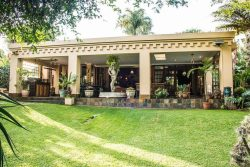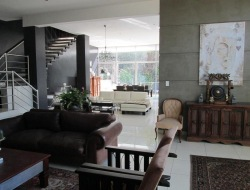Security remains one of the main factors influencing home buying decisions in Gauteng, and to see the influence it can have on property values, simply look at the difference in prices between access-controlled areas and neighbouring areas without such controls.
 This Lynnwood Manor home offers four bedrooms, four bathrooms, fitted kitchen, swimming pool, an undercover patio and a double garage. It is on the market for R3.3 million – click here to view.
This Lynnwood Manor home offers four bedrooms, four bathrooms, fitted kitchen, swimming pool, an undercover patio and a double garage. It is on the market for R3.3 million – click here to view.This is according to David Jacobs, Northern Region and KZN Regional Manager for the Rawson Property Group, who says figures from property data company Lightstone show, for example, that while prices in the closed Johannesburg suburb of Hurlingham have risen by about 42% over the past five years, those in nearby Parkmore have only risen by 32%.
And there are many other such examples all over greater Johannesburg, where the Roads Agency says at least 350 boomed-off enclaves have been created in the past 15 years.
Jacobs says strong demand for homes in the boomed-off areas of Morningside Manor, Gallo Manor and Wendywood, for instance, has resulted in these areas achieving house price increases of up to 49% in the past five years, which is well in excess of the average.
“To the east of the city, prices in Kensington have only grown about 14% in the past five years, despite the high demand for homes here due to its proximity to the city centre, while prices in the closed-off areas of Edenvale, considerably further away, have risen by as much as 58%.”
 Situated in Lynnwood Manor, this house has three bedrooms, two bathrooms, a swimming pool, 24-hour security and a double garage. It is priced at R2.745 million – click here to view.
Situated in Lynnwood Manor, this house has three bedrooms, two bathrooms, a swimming pool, 24-hour security and a double garage. It is priced at R2.745 million – click here to view.Meanwhile, in Tshwane, he says the Lightstone figures show that the average home price in Moreleta Park, where there are several boomed enclaves, has risen by 24% over the past five years, whereas prices in neighbouring Waterkloof Glen have risen by an average of only 11%.
And similarly, prices in the closed-off area of Lynnwood Manor have grown by an average of 49% over the past five years, while those in neighbouring Lynnwood have only grown by an average of 33%.
“So, apart from the immediate gains of a reduction in crime and possibly a reduction in one’s household insurance premium, living in a secured suburb also delivers a demonstrable long-term financial advantage for homeowners.”
Jacobs says among prospective home buyers, on the other hand, properties in boomed-off areas are popular because they tend to offer more privacy than homes in security complexes and gated estates, and are often also cheaper and more conveniently located for the buyer’s purpose.”
This is important for home sellers, he says, because suburban homes increasingly have to compete in terms of security perceptions against those in actual estates.
He says buyers are well aware of police crime statistics, which show that although some types of crime have decreased over the past nine years, the number of home robberies and burglaries has risen by some 70%. And they are no longer satisfied with vague assurances that an area is ‘relatively safe’ or has a ‘low crime rate’, he says.
What is more, Jacobs says they don’t just want booms and guards at the entrance to the suburb. They also want the individual homes they buy to come complete with their own security equipment, including burglar bars, security gates, security lights and an alarm system at the very least, he says.
Jacobs says most buyers are just not willing to move into an unprotected home, even for a short while, and that the few who are prepared to buy and then install their own security provisions are increasingly driving a hard bargain when it comes to making an offer.
They will calculate the total cost of a top-of-the-range system and simply insist that the sellers subtract that amount from their asking price, he says.







